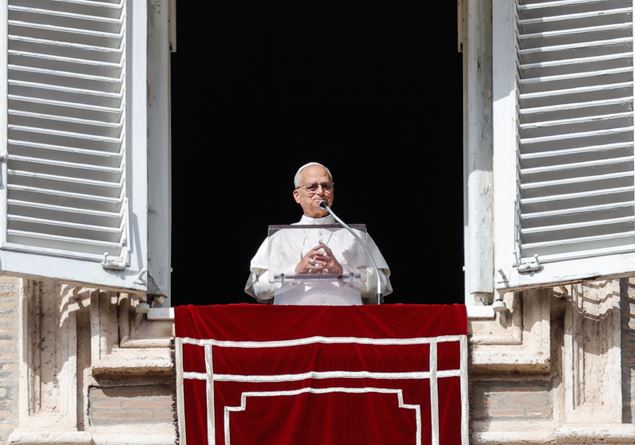During today’s Angelus, Pope Leo XIV he meditated on the Gospel of Luke (18.9-14), which tells the parable of the Pharisee and the tax collector. Two men praying in the Temple: the first, observant of the Law and proud of his works, looks at the others with contempt; the second, a tax collector, recognizes himself as a sinner and asks for forgiveness. “Yet – the Pontiff recalled – it is he who returns home justified, that is, forgiven and renewed by the encounter with God”. The Pope explained that the difference lies not in the works, but in the attitude of the heart. «It is not by flaunting one’s merits that one is saved – said Leo XIV – nor by hiding one’s mistakes, but by presenting oneself honestly before God, with trust and humility». Then he quoted Saint Augustine, who compares the Pharisee to a sick person who, out of pride, hides his wounds, and the publican to someone who, with courage, shows them to the doctor to be healed. “Let us do the same – urged the Pope –: let us not be afraid to recognize our mistakes and entrust them to the mercy of God. The Kingdom belongs to the humble, not to the proud”. After the Marian prayer, Leo XIV expressed his closeness to the populations of Eastern Mexicohit by serious floods, and invited us to pray for peace through the recitation of the Rosary: «Contemplating the mysteries of Christ together with Mary – he concluded – we learn to share the suffering and hope of those who are victims of wars. Blessed are the peacemakers!
Below is the Pope’s full speech at the Angelus
Dear brothers and sisters, happy Sunday!
Today the Gospel (see Luke 18.9-14) presents us with two characters, a Pharisee and a tax collector, who pray in the Temple.
The former boasts a long list of merits. The good works he does are many, and for this reason he feels better than others, whom he judges contemptuously. He stands, head held high. His attitude is clearly presumptuous: it denotes an exact observance of the Law, yes, but poor in love, made up of “giving” and “having”, of debts and credits, devoid of mercy.
The publican is also praying, but in a very different way. He has a lot to make up for: he is a tax collector in the pay of the Roman Empire, and works with a contract that allows him to speculate on the proceeds to the detriment of his own compatriots. Yet, at the end of the parable, Jesus tells us that he, of the two, is the one who returns home “justified”, that is, forgiven and renewed by the encounter with God. Why?
First of all, the publican has the courage and humility to present himself before God. He does not close himself off in his own world, he does not resign himself to the evil he has done. He leaves the places where he is feared, safe, protected by the power he exercises over others. He comes to the Temple alone, without an escort, even at the cost of facing harsh looks and sharp judgments, and stands before the Lord, after all, with his head down, uttering a few words: “O God, have mercy on me, a sinner” (v. 13).
Thus Jesus gives us a powerful message: it is not by flaunting our merits that we are saved, nor by hiding our mistakes, but by presenting ourselves honestly, as we are, before God, ourselves and others, asking for forgiveness and entrusting ourselves to the grace of the Lord.
Commenting on this episode, Saint Augustine compares the Pharisee to a sick person who, out of shame and pride, hides his wounds from the doctor, and the publican to another who, with humility and wisdom, lays bare his wounds, however ugly they may be, before the doctor, asking for help. And he concludes: «It does not surprise us (…) if that publican, who was not ashamed to show his sick side, returned (…) healed» (Sermo 351.1).
Dear brothers and sisters, let us do the same. Let us not be afraid to recognize our mistakes, to lay them bare by taking responsibility for them and entrusting them to the mercy of God. His Kingdom will thus be able to grow, in us and around us, which does not belong to the proud, but to the humble, and which is cultivated, in prayer and in life, through honesty, forgiveness and gratitude.
We ask Mary, model of holiness, to help us grow in these virtues.
_____________________________________
After the Angelus
Dear brothers and sisters!
I am close with affection to the people of eastern Mexico, affected by the floods in recent days. I pray for the families and for all those who suffer due to this calamity, and I entrust to the Lord, through the intercession of the Holy Virgin, the souls of the deceased.
Our prayer for peace continues incessantly, particularly through the community recitation of the Holy Rosary. Contemplating the mysteries of Christ together with the Virgin Mary, we make our own the suffering and hope of children, mothers, fathers, elderly victims of wars… And from this intercession of the heart arise many gestures of evangelical charity, of concrete closeness, of solidarity… To all those who, every day, with confident perseverance, carry forward this commitment, I repeat: “Blessed are the peacemakers”!
I greet all of you, Romans and pilgrims from Italy and many parts of the world, in particular those from Logroño, Spain, San Pedro del Paraguay, Recreio (Brazil) and the Cubans residing in Europe.
I also greet the faithful of Ginosa, Genoa, Corato, Fornovo San Giovanni, Milan, San Giovanni Ilarione, Porto Legnago, the children of Scicli, the confirmands of the Diocese of Saluzzo, the Reparation Sisters of the Sacred Heart who are celebrating 150 years of foundation, the Communion and Liberation group of Pavia and the Polyphonic Choir of Milazzo.
Thank you all! Happy Sunday!


